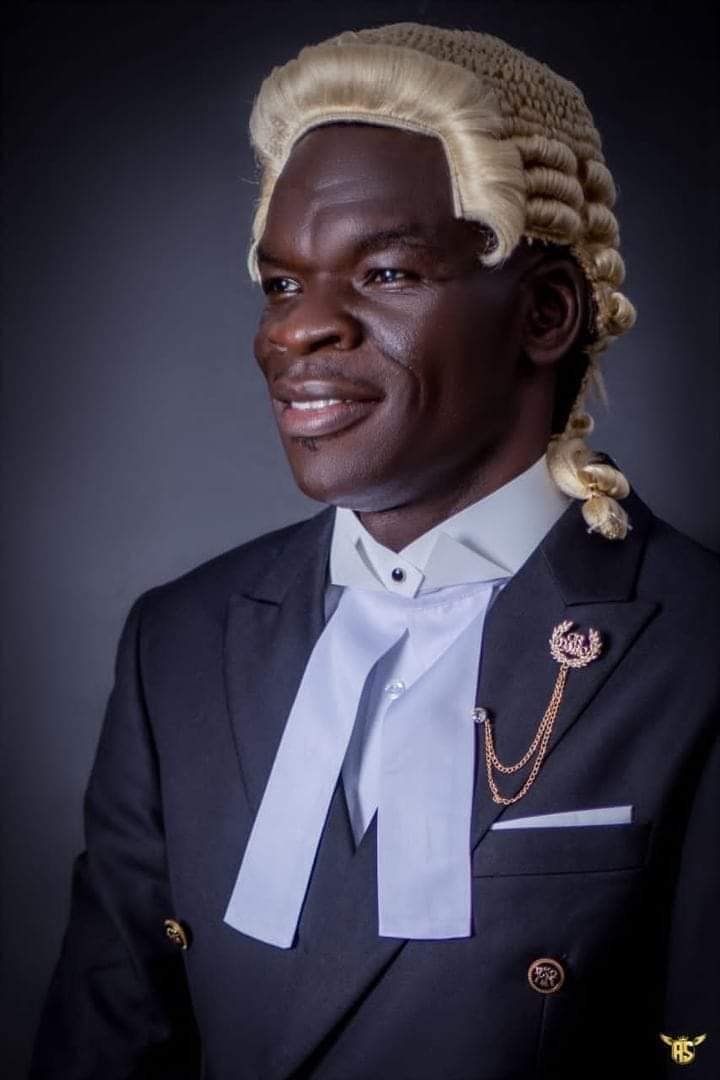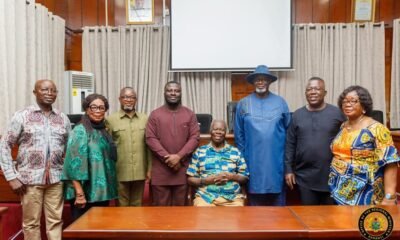Profile
Meet Korkor & Jerry: The developers working to solve teacher absenteeism

Software and application development is one of the fast growing areas in the technology industry and more young people continue to bring out the creativity in them in this regard.
Last weekend, about 30 trainees who had acquired skills in software development converged in Accra to showcase mobile and web applications they had designed to tackle specific issues across different sectors.
Some of the applications demonstrated included: ‘Alodie’ an application that allows people to send money into mobile money accounts without using USSD codes; ‘FundFair’ which connects low income earners to donors to allow them pay off medical debt; ‘Sparky’— a platform that connects start-ups to investors; ‘Go Legal’ — designed to connect clients to lawyers, and many other applications which are not yet available to the public.
Another which could be of immense benefit to stakeholders in the education sector, is a mobile application intended to solve teacher absenteeism. The developers, Korkor Mensah and Jerry Gasu, spoke about their inspiration for the project and the prospect of the innovation they were looking forward to implementing fully.
Application
The partners in an interview with The Spectator said they took up the initiative because “the absence of teachers tends to negatively impact teaching and learning in schools.”
“Teacher absenteeism affects the confidence of parents and leads to low turnout of students so we decided to build an application that does a real time tracking of the teacher’s presence or absence,” the duo noted.
The application, according to the developers, “allows a teaching staff to scan a Quick Response (QR) code with his or her mobile phone and logs in with identification (ID) which has already been generated for him or her.
“After the teacher successfully logs in, he is automatically seen on a dashboard that is monitored by the administration of the school. The application then records the number of teachers who reported on time, those who reported late as well as those who did not show up at all,” they explained.
Collaboration

Ms Mensah is a Quality Assurance Test Analyst at Ecobank. In her role, she ensures that mobile and web applications and systems “are tested to ensure they are fit for purpose or do not have any defects.”
She had enrolled her two children at Codetrain, a Ghanaian tech company that trains individuals to become software developers, but was compelled to eventually take up the course and acquire the skills herself.
Jerry, on the other hand, started teaching himself how to code at home but realised there was more to learn beyond the self-taught approach he had adopted and, therefore, signed up to the structured courses that were being offered by the institution.

It was during the one-year intensive training at Codetrain that they both decided to work together on the teacher absenteeism application which they hope to fine-tune and make available to schools across the country.
“This is a demo and we have not rolled it out on full scale. We are open to other ideas and collaboration because this [application] solves a social problem. Our hope is to be able to roll out to schools in Ghana and possibly across Africa.
“If teachers are absenting themselves from classes then we will never get the quality education we want to give our children so this application is going to solve a challenge in the education system and we hope to partner other organisations to make this a reality,” Ms Mensah said.
Beyond Codetrain, Jerry intends to start his own business and continue to solve “real world problems” with his expertise.
Insight
The partners admitted that there were other applications that dealt with absenteeism but this did not stop them from coming up with their own innovation or solution.
“We know other well-established organisations have applications they use internally to track attendance of staff but in our research we do not think teachers are scanning QR codes to log in their attendance; they still make use of a notebook or a register.
“There are other applications solving the same problem but there is never a single solution to a problem. We decided to focus on the educational sector because we know ours will be unique,” Ms Mensah stated.
She was one of the few females among the graduating cohort. She said her aim of becoming a Quality Assurance Engineer in future would require programming skills hence the decision to join the course at Codetrain which she described as insightful.
“I work closely with application developers; the developers make the application, then my role is to test it. So I believe the skills I have now would help me to become a good Test Analyst.
“A year ago, I did not know how to code, I could not write a single line of code. My 10-year-old son brought a coding assignment home and I could not help him. I was really embarrassed and felt I had let my son down so weeks later I enrolled at Codetrain and a year down the line, the journey has been rewarding,” Ms Mensah recounted.
The developers encouraged individuals to sharpen their technology skills and explore the opportunities as well as solutions they could provide within the sector.
Ms Mensah advised young women to aspire to fill the existing gap in the technology industry while Jerry also urged aspiring software developers to be patient and remain focused because their efforts would eventually yield results.
Profile
Prisca Abah: Ghana’s modelling powerhouse

Ghanaian model, philanthropist and advocate, Prisca Abah, who is known for her contributions to the fashion industry, is strutting her stuff on higher levels.
She was recently selected as one of the models for the Big8 Girls Project, an initiative by Clinton Samuel to celebrate influential African models.
The project consisted of three episodes: the Bio Shoot which highlighted Abah’s professionalism through a corporate-themed photoshoot; Afrodeity which focused on showcasing her confidence and artistry, celebrating the African divine feminine and royalty which presented Abah as a symbol of African cultural pride, embodying strength and elegance.

The Big8 concept, produced by Clinton Samuel, intentionally highlights and celebrates the strongest and most influential models on the African continent, congratulating their steadfastness and contributions to the African fashion industry, even as they grind and win in other aspects of life.
The Big8 sets hierarchy and high standards in the African fashion and modelling industry, crowning eight of them with the ‘Top Model’ status as the leading female models in Ghana at the moment.
“Working with these fiery women will surely ignite more creative minds and stir the pot of positive competition,” said Clinton.

Abah’s early life and career
Prisca Abah began her modelling career in 2013, achieving her first notable milestone in 2014 with an editorial shoot for 5-Star International Modelling Agency. In 2015, she made her runway debut at the Ghana Fashion Awards.
From 2016 to 2018, Abah participated in major African fashion events such as Glitz Africa Fashion Week, Mercedes-Benz Fashion Week in Johannesburg, and Rhythms on the Runway.
During this period, she received accolades, including the “Best Female Model of the Year” and spoke as a UN Ambassador for Sustainable Development Goal 12 at the Sustainable Rice Platform Conference.
International recognition and pageantry
In 2022, Abah expanded her reach by entering the pageantry world. She placed as the first runner- up at the Beauty of Africa International Pageant and represented Ghana at the Miss Globe World Finals, where she earned the title of Miss Globe Africa 2022.

Philanthropy
Abah founded the Palins Foundation, a non-profit organisation, aimed at empowering women and youth through initiatives in education, skills training, and personal development.
Awards and collaborations
In 2023, Abah received the Best Model of the Year award at the Time Ghana Arts and Entertainment Awards. She has collaborated with leading designers such as Charlotte Prive and Ejiro Amos Tafiri, further solidifying her influence in African fashion.
Legacy
Prisca Abah is recognised not only for her contributions to the fashion industry but also for her philanthropic efforts. Her journey serves as an inspiration to young Africans, encouraging them to pursue their dreams while giving back to society.
By Edem Mensah Tsortorme
Profile
Juventus Duorinaah, Ghana’s first deaf Lawyer

In a landmark moment for Ghana’s legal landscape, Juventus Duorinaah Esq., has etched his name in history as the country’s first lawyer with a hearing impairment.
His journey from a humble background to breaking barriers in the legal profession serves as a powerful inspiration for countless individuals in the disability community, proving that determination and resilience can defy societal expectations and create pathways to success.
For Juventus, the recognition as Ghana’s first deaf lawyer feels surreal.
“It feels like a dream,” he reflects, acknowledging the stereotypes surrounding deafness and the humble background from which he hails.
Juventus’ passion for law sparked in 2008 while seeking admission to the University of Ghana (UG). Although he initially faced challenges due to the nature of the application process, the help of his older brother and his determined spirit led him to pursue a Bachelor of Arts degree in 2012, followed by a Master of Laws at Cardiff University in 2014.
His passion for the study of law became highly intense when he had to study alongside qualified lawyers from several jurisdictions, even though he did not have a legal background. Here, he faced the unique challenge of studying without sign language interpreters, relying instead on a palantypist to transcribe lectures.
Juventus’ role model was his professor and mentor, Professor Luke Clement, who profoundly inspired him in shaping his understanding of law and human rights.
He remembers Prof. Thomas Stephens from the University of Ghana School Of Law, who inspired him with his way of dressing, in-depth knowledge of the law and engagement with students.
He recounts the enormous challenges he encountered during the COVID-19 pandemic in 2020, when lectures moved online, and Dr Stephen’s tremendous support to ensure things moved quickly and smoothly for him.
“I also had the chance to have a few classes with the Dean himself, Prof. Raymond Atuguba. He taught the course such that some of us never felt scared as other lecturers made the course,’ he recalled.
Juventu’s academic journey was fraught with challenges, particularly in communication.
The year 2007 was the last time he studied with deaf peers. He was often the only deaf person in his classes throughout the following years of his education, which made interaction with peers difficult.
Despite these hurdles, he remained high-spirited, studying late into the night and seeking help from kind classmates when necessary.
Reflecting on his academic experience at UG, he connected his affection for the university to his older brother, who is also an alumnus. He felt inspired to be a student of the premier university, saying he would choose the University of Ghana any time, any day, if given the chance to further his studies or work.
The University Of Ghana School Of Law, along with its Dean, Professor Raymond Atuguba, the Director of Legal Education of the Ghana School of Law, Yaw Bramiah Oppong, and his capable team, including the Registrar and Deputy Registrar of the Ghana School of Law and the Office for Students with Special Needs (UG), made significant contributions to his journey.
Prof. Atuguba acknowledged Juventus’ achievement as evidence of the university’s commitment to Diversity, Equity and Inclusion.
Commenting on how the school accommodated his special needs, Prof. Atugugba explained that ‘In the case of Juventus, we worked closely with him to understand and address his special needs, ensuring he had access to the teaching and learning resources in the appropriate formats that would support his academic journey.
Professor Atuguba noted that Juventus’s journey is just beginning, and the future holds promise for him and the many lives he aims to touch along the way.
Juventus’s close friend, Ida Esi McOwusu Esq., described her first encounter with Juventus as ‘intriguing.’ “My first meeting with Juventus was in class, where he sat right in front of me in first year,” Ida reveals. She was intrigued and wanted to find out more about him, especially how Juventus navigated his way to this level. “I got closer and we became friends from there,” she remarked.
Mr Francis Kweku Essel, Juventus’ interpreter, shed light on the primary challenges he faced in carrying out his job, particularly the complex nature of legal terminology and concepts. This validates Ida’s comment on the interpreters’ lack of legal background as a challenge Lawyer Duorinaah encountred.
Juventus dreams of becoming a judge and aims to enhance justice delivery while serving as a role model for young people with disabilities.
He is currently mentoring a group of young deaf students interested in pursuing law, hoping to pave the way for future generations. What’s next for Lawyer Juventus? His next step is to complete his pupilage, after which he can decide further his legal career.







